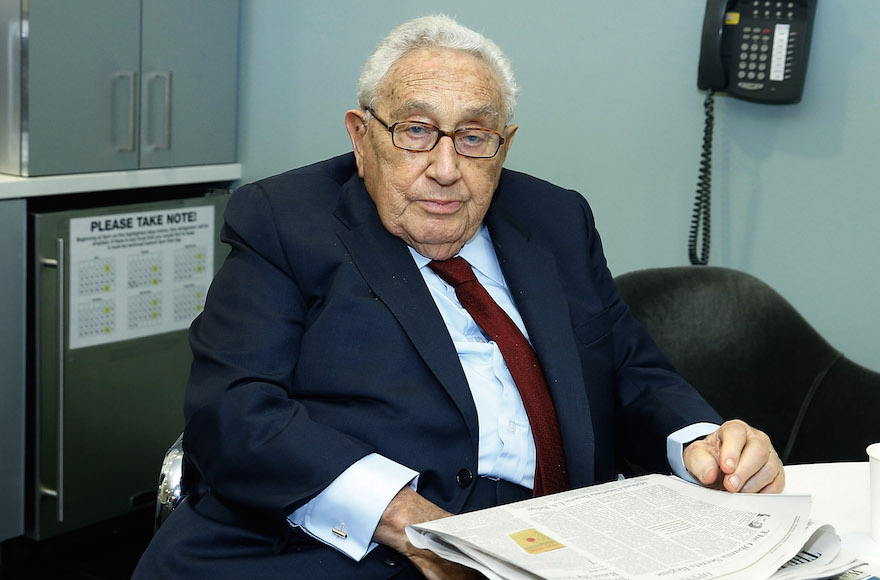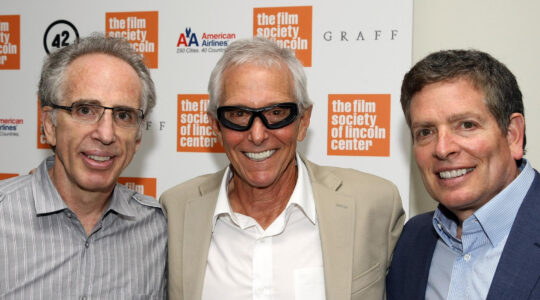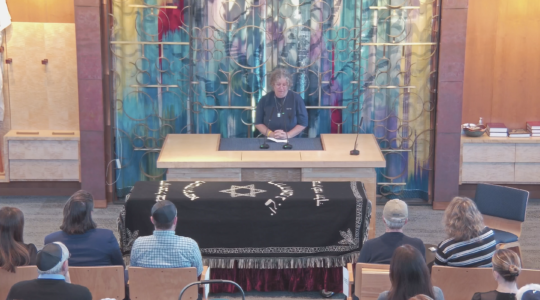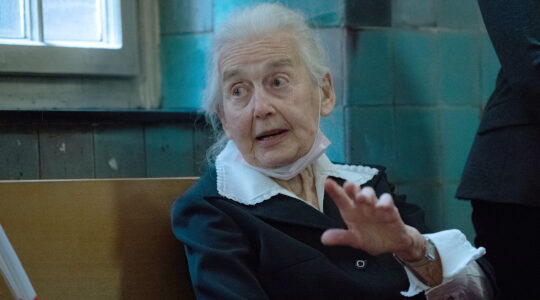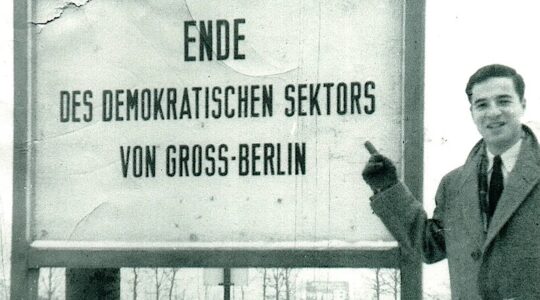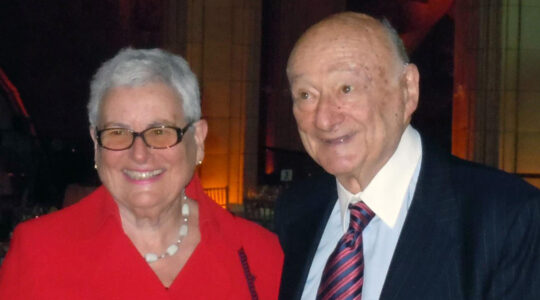(JTA) — Henry Kissinger, the first Jewish secretary of state and the controversial mastermind of American foreign policy in the 1970s — orchestrating the U.S. opening to China, negotiating the end of the conflict in Vietnam and helping ease tensions with the Soviet Union at the height of the Cold War — has died.
Kissinger died at his home in Connecticut on Wednesday at 100, according to a statement posted to his website. He had celebrated his 100th birthday in June with a party at the New York Public Library featuring luminaries from throughout his long career in politics and public affairs, including his current successor, Jewish Secretary of State Antony Blinken.
Regarded as a brilliant diplomatic strategist, Kissinger was one of the most influential Jewish figures of the 20th century, leaving an enduring imprint on global politics as secretary of state and national security advisor to two U.S. presidents and as an informal advisor to several others.
With his rumbling German accent, iconic black glasses and legendary charm, he was also a socialite and an unlikely 70s-era sex symbol, dating a string of movie stars and famously quipping that power is “the ultimate aphrodisiac.”
Despite fleeing his native Germany as the Nazis rose to power in the 1930s and losing several members of his family in the Holocaust, Kissinger evinced little sentimental attachment to Jewish interests, telling a friend in the 1970s that Judaism “has no significance for me,” according to Walter Isaacson’s 1992 biography.
The negation of Kissinger’s Jewish identification may have been necessary for a man who rose higher in the executive branch than any Jew before him, and did so under a president, Richard Nixon, known to harbor deep anti-Jewish animus. Others saw it as emblematic of Kissinger’s Machiavellian streak and embrace of realpolitik, the hard-nosed approach to diplomacy that eschews moral concerns in favor of raw assessments of national interests.
After Israeli Prime Minister Golda Meir pressed Nixon in 1973 to address the plight of Soviet Jews, Kissinger issued a blunt dismissal.
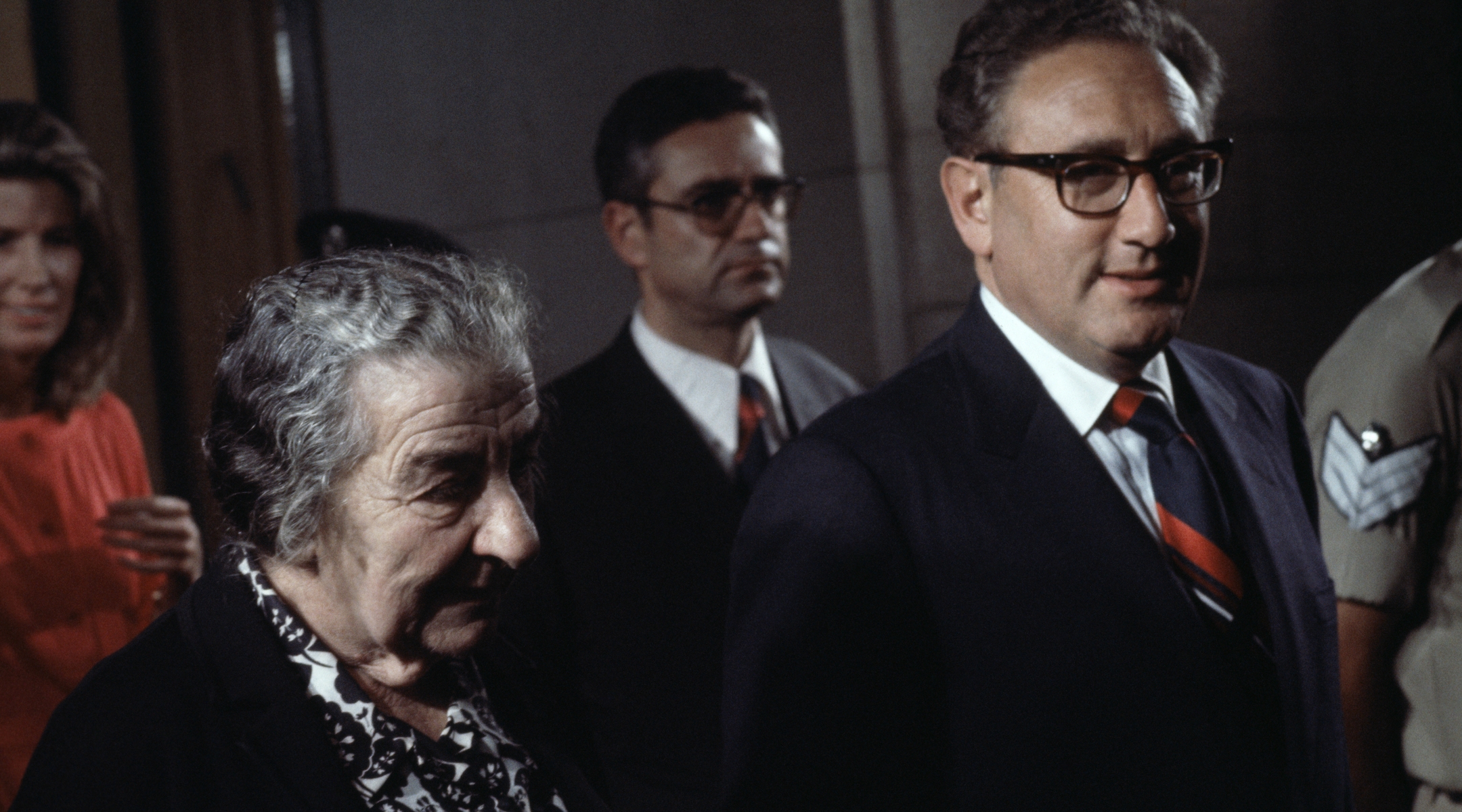
Golda Meir and Henry Kissinger in Israel in 1974. (William Karel/Gamma-Rapho via Getty Images)
“The emigration of Jews from the Soviet Union is not an objective of American foreign policy,” Kissinger said, according to Oval Office recordings. “And if they put Jews into gas chambers in the Soviet Union, it is not an American concern. Maybe a humanitarian concern.”
After the recordings were released in 2010, Kissinger apologized for the gas chamber remark in a Washington Post op-ed but maintained his critics were taking it out of context. Kissinger went on to claim credit for the 100,000 Soviet Jews who emigrated thanks to Nixon’s “quiet diplomacy.”
Other elements of Kissinger’s record similarly suggest a more nuanced verdict on his approach to Jewish concerns. At the height of the Yom Kippur War in 1973, Nixon ordered an emergency airlift of resupplies to a struggling Israeli military, and memos from the period show Kissinger pushing back against the Pentagon’s reluctance to carry it out.
Later, Kissinger’s efforts to end the war gave birth to the term “shuttle diplomacy.”
Two years later, as Kissinger grew increasingly frustrated with Israeli intransigence in withdrawing from areas of the Sinai conquered in the 1967 war, he pushed Ford to conduct a “reassessment” of relations with Israel. That precipitated a deep crisis between the White House and the Israeli government, but it ultimately yielded an Israeli-Egyptian agreement to resolve outstanding disputes peacefully, which in turned paved the way for the peace treaty that followed four years later.
“There’s no way you could tell the story of Camp David and the Egyptian-Israeli peace treaty without mentioning Kissinger and the 1973 shuttle diplomacy,” said historian Gil Troy. “If you want to buy into the tough love rather than the love-love approach to U.S.-Israeli relations, the best example would be the March 1975 reassessment.”
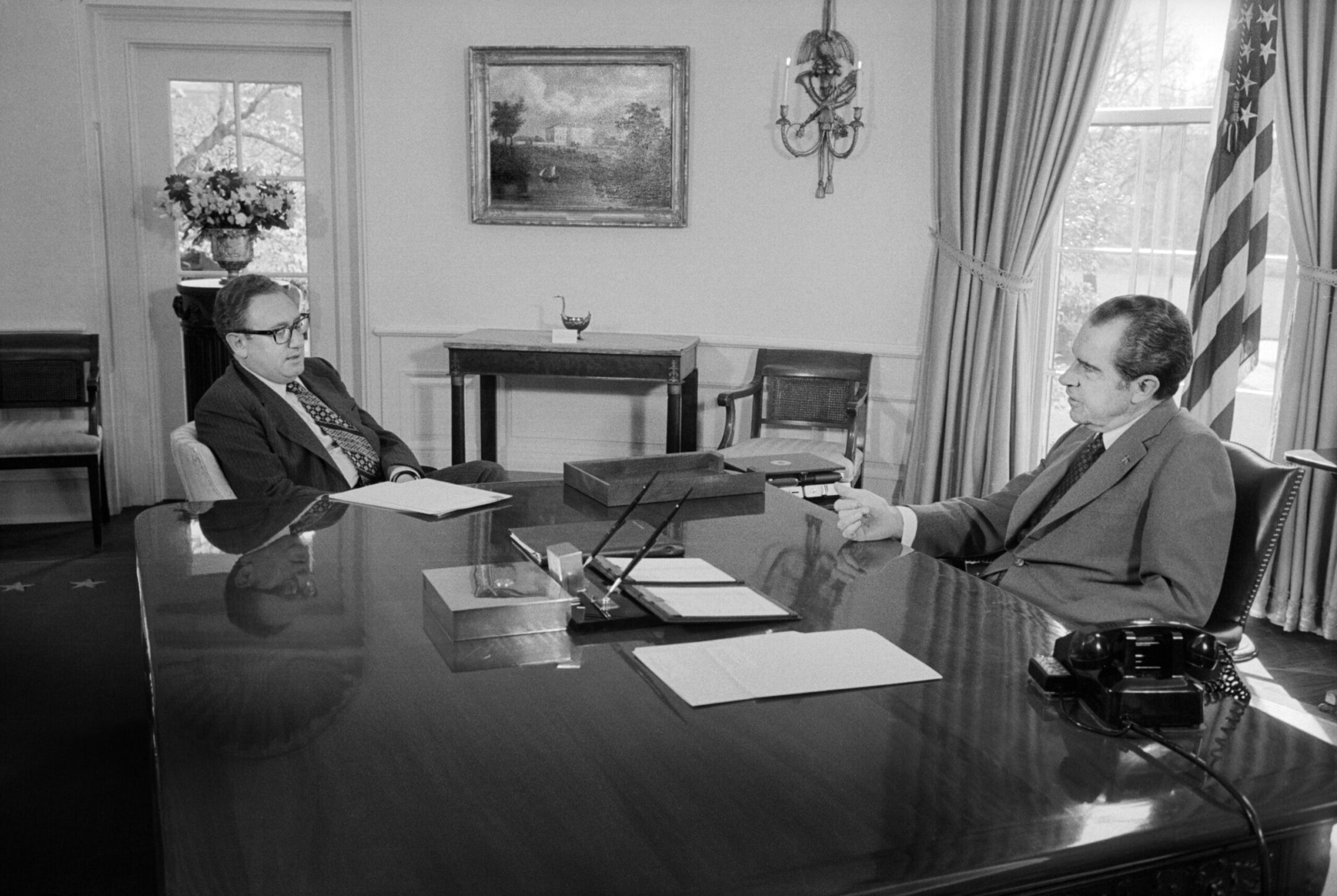
Secretary of State Henry Kissinger meets with President Richard Nixon at the White House, March 22, 1974. (Marion S. Trikosko/Universal History Archive/Universal Images Group via Getty Images)
Troy also records a less glowing incident about Kissinger in his 2013 book “Moynihan’s Moment.” As the U.S. Ambassador Daniel Patrick Moynihan waged a very public battle against the “Zionism is racism” resolution at the United Nations, Kissinger pushed back hard, fearing it would undermine his efforts to ease tensions with the Soviet Union, at one point grumbling, “We are conducting foreign policy. … This is not a synagogue.”
Nixon loved to rib Kissinger about his Jewish origins and his accent. The president later recalled that he told Meir they both had Jewish foreign ministers, referring to Kissinger and Abba Eban. “Yes, but mine speaks English,” Meir rejoined, to Nixon’s great amusement.
After leaving office, Kissinger appeared to shed some of his reluctance to be perceived as Israel’s champion, stating in a 1977 speech that, “The security of Israel is a moral imperative for all free peoples.” In the decades that followed, he publicly defended Israeli interests, arguing that the absence of Mideast peace was the product of Arab intransigence and expressing skepticism of efforts to conclude a nuclear deal with Iran.
That in turn helped secure his embrace by the Jewish mainstream. In 2012, he received Israel’s highest civilian honor from President Shimon Peres for his “significant contribution to the State of Israel and to humanity.” In 2014, he received the Theodor Herzl Award from the World Jewish Congress. At the award presentation, WJC President Ronald Lauder recalled Kissinger telling Meir that he was an American first, secretary of state second and a Jew third. According to Lauder, Meir responded that was fine since Israelis read from right to left.
“He was very insecure,” said Troy. “The trauma of being a survivor, and the trauma of being an immigrant, of being an outsider. The 1970s was not a very Jewish decade. It was strange to have Jews in power, and strange to have Jews in Republican circles of power. Given his own ambivalence, and given the hostile environment that he was in, it’s not surprising that he would be pretty screwy on the Jewish question.”
Kissinger’s legacy remained deeply polarizing decades after he left public office. Despite winning the Nobel Peace Prize in 1973 for his work ending the Vietnam War — a deeply controversial choice at the time — many regard Kissinger as a war criminal, responsible for the deaths of thousands of civilians in the U.S. bombing of Cambodia and myriad other human rights violations in Argentina, East Timor and elsewhere. His role in directing the controversial war in Vietnam dogged him for decades.
After he left office in 1977, hundreds of students and faculty opposed Columbia University’s decision to offer Kissinger an endowed chair, with one student demonstrator likening it to asking Charles Manson to teach religion. The author Christopher Hitchens called for Kissinger’s indictment in a 2001 book, “The Trial of Henry Kissinger,” which was later made into a film. On a 2001 trip to Paris, a French judge sought unsuccessfully to get Kissinger to testify in connection with the 1973 disappearance of five French nationals during the reign of Chilean dictator Augusto Pinochet.
Kissinger tried mightily to shape the public narrative of his years in office, penning multiple memoirs totaling thousands of pages. But even into his 90s, he could barely appear in public without inviting protests.
In 2015, protestors disrupted a Senate hearing where Kissinger was testifying with chants that he should be arrested. And in 2016, Kissinger’s address to the Nobel Institute’s Peace Forum in Oslo was met with protests and a petition with 7,000 signatures demanding his arrest for violations of the Geneva Conventions.
Heinz Alfred Kissinger was born in Bavaria, Germany in 1923. His father Louis was a schoolteacher and his mother Paula a homemaker. In 1938, the family fled the Nazis for London and later New York, where they settled in a German-Jewish immigrant community in Washington Heights. Kissinger studied accounting at City College before being drafted into the army in 1943, serving as an intelligence officer and seeing combat in the Battle of the Bulge.
After the army, Kissinger enrolled at Harvard University, where he earned his bachelor’s, master’s and doctoral degrees in political science. As a faculty member in the university’s government department, Kissinger served as an advisor to multiple government agencies.
In 1969, Kissinger was sworn in as Nixon’s national security advisor. He became secretary of state in 1973 and continued to hold both positions following Nixon’s resignation and Gerald Ford’s assumption of the presidency.
As the chief architect of U.S. foreign policy during the period, Kissinger pioneered the policy of detente, helping to defuse tensions with the Soviet Union and paving the way for Nixon’s groundbreaking 1972 summit with Chinese leader Mao Zedong. That led to the resumption of relations between the two nations, eventually leading to the full normalization of ties in 1979.
In Vietnam, Kissinger and Nixon attempted to wind down the conflict by withdrawing American troops and supporting the South Vietnamese Army in its efforts to repel Communist forces. In support of that effort, Kissinger helped orchestrate a secret bombing campaign in Cambodia against Vietnamese Communist forces based there, killing tens of thousands.
Kissinger left office with Jimmy Carter’s election in 1976 but scarcely faded from view. He remained a fixture of the Washington scene, teaching at Georgetown, consulting for New York financial firms and delivering high-priced corporate lectures.
In 1982, he founded Kissinger Associates, a secretive New York consulting firm that has advised major multinational corporations. Kissinger backed out of his appointment by President George W. Bush as chairman of the commission investigating the Sept. 11 terrorist attacks after Congress requested that he disclose his client list.
Kissinger was a recipient of the 1977 Presidential Medal of Freedom. In 1980, he won a National Book Award for the first volume of his memoirs, “The White House Years.” In 1995, he received an honorary knighthood from Queen Elizabeth. He was also the first person to be named an honorary member of the Harlem Globetrotters basketball team.
Kissinger is survived by his wife, Nancy Maginnes; two children from his first marriage to Ann Fleischer, whom he divorced in 1964; and five grandchildren.
JTA has documented Jewish history in real-time for over a century. Keep our journalism strong by joining us in supporting independent, award-winning reporting.
